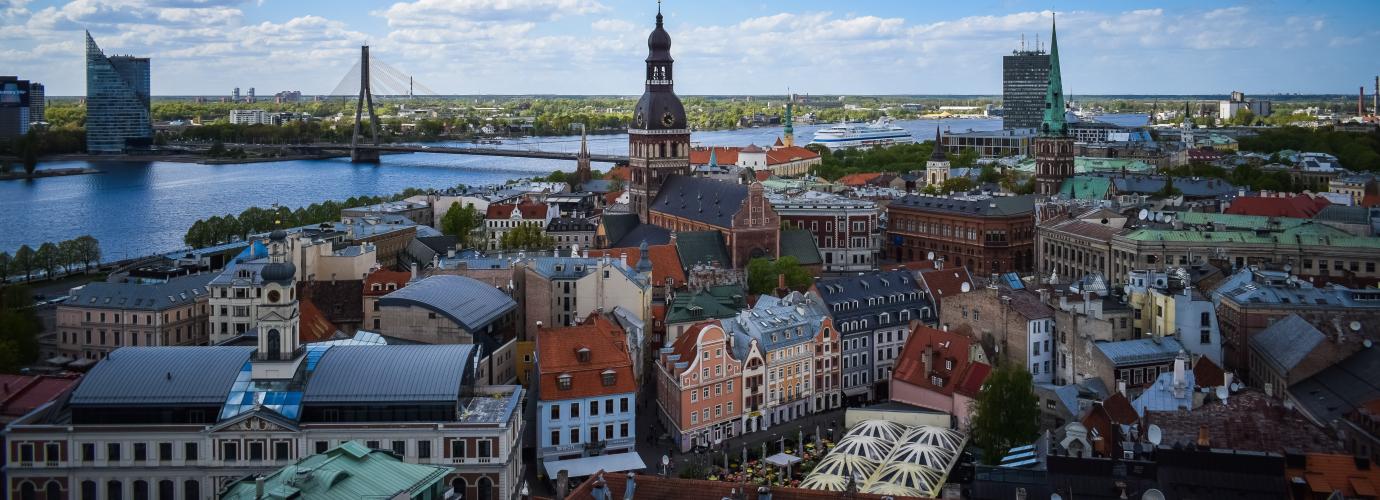Branches of study
According to thematic groups of education determined in the Regulations on Classification of Education in Latvia and the Law on Institutions of Higher Education, education programmes are available in the following study fields:
- Education,
- Humanities and Arts,
- Social Sciences, Business and Law
- Natural Sciences, Mathematics and IT,
- Engineering, Production and Construction,
- Agriculture,
- Health and Welfare,
- Services (for example, personal services, such as hotel, restaurant, beauty treatment etc., transport services, environmental protection and civil and military defence).
Second cycle education programmes in Latvia last one or two years.
Admission requirements
The prerequisite for the admission to a Master programme (academic studies) is a Bachelor degree in the same or related field of science.
Only candidates with Bachelor degree or at least four-year studies leading to professional qualification are eligible to second-level professional higher education programmes offered as Master or Professional (higher level of studies after an academic degree) programmes.
Curriculum
Higher education institutions may independently determine the timetable for students. The capacity of studies is measured in credit points (credits). Latvian credit point is defined as a full-time weekly study load. Latvian credit point system is compatible with European Credit Transfer and Accumulation System (ECTS) and is used for both accumulation and transfer since its implementation. The number of ECTS credits is found by multiplying the number of Latvian credit points by a factor of 1.5.
In Latvia, one credit corresponds to 40 academic hours (one study week) of which up to 50% are expected to be contact hours. The nominal study year comprises forty credits.
An academic hour is a unit of study time lasting 45 minutes. A contact hour is a direct interface between students and academic staff lasting one academic hour.
The amount of Master study programmes is 80 credit points including at least 20 credit points for Master thesis. The compulsory content of Master programmes includes research on theoretical conclusions (at least 30 credit points) of the respective area in the field or sub-field of science and approbation of theoretical conclusions (at least 15 credit points) currently important in the field or sub field of science.
The amount of professional higher education master study programmes (second-level professional higher education programmes) is at least 40 credit points. Study courses include approbation of recent accomplishments in theory and practise of the study field, courses on management, research work, pedagogy and psychology. Internship and state examinations involving the development and defence of Master or Diploma thesis are also a part of compulsory study content.
Teaching methods
Teaching methods are chosen by academic staff of the institution, depending on the type of studies and specifics of individual courses.
Teaching is structured by discipline, and the main teaching methods are lectures and seminars. Lectures are held for larger groups of students, and involve little student activity, whereas seminars are based on active participation and performance. Other teaching methods include exercises, consultations, seminar papers and reports, practical work, internships, individual studies, projects, laboratory works, and colloquia; in arts – individual training lessons.
Various teaching materials may be used in teaching and learning process, their choice is upon the lecturer, and students themselves may choose supplementary reading.
Progression of students
Progression to the next year is automatic if the student has fulfilled all requirements set by the study programme. There are no regulations regarding the number of times the student can attempt to pass an examination, but a mechanism has been developed by several institutions to raise students’ motivation – an extra payment must be made in order to pass an examination repeatedly.
It is possible to interrupt studies for a short period of time. Each higher education institution defines provisions regarding the length of study break, possible reasons, procedure etc.
Employability
Students may seek assistance and advice concerning study process in counseling centers of higher education institutions and administrative units of the respective faculty. In the recent years the issue of guidance services has gained more importance. Several higher education institutions offer a wide range of services, not only career counselling, but also training on how to apply for a job consisting of general information, information on vacancies, and supplementary training.
Student assessment
The main principles of student evaluation in higher education (both academic and professional) are as follows:
- principle of mandatory evaluation – it is necessary to acquire positive assessment on the content of programme;
- different methods are used to determine assessment (the main forms are tests and examinations);
- adequacy of evaluation: students are given a possibility to prove their analytical, creative skills and acquired knowledge.
10-scale grading system is used to evaluate academic performance on all levels of higher education:
- Very high level (outstanding – 10, excellent – 9);
- High level (very good – 8, good – 7);
- Medium level (almost good – 6, satisfactory – 5, almost satisfactory – 4);
- Low level (a negative assessment: poor –3, very poor – 2, very, very poor – 1).
The lowest "pass" grade is 4 – "almost satisfactory". "Pass" and "Not pass" are used for assessing tests and internship.
The main form of evaluation is end-of-semester examinations, when students receive credit points for every course and get their internship assessed with "pass" or at least "4" in 10-scale grading system. However, continuous evaluation during the semester may be carried out by lecturers as well.
Certification
Students of second-level professional higher education programmes (Profesisonālās augstākās izglītības Maģistra studiju programma, Profesionālās augstākās izglītības studiju programma) also pass final examinations at the end of studies. Part of final examinations is the development and presentation of Master or Diploma thesis. Graduates receive:
- Master’s diploma, or
- Master’s diploma and diploma of professional qualification (level 7 professional qualification), or
- Diploma of professional qualification (level 7 professional qualification).

